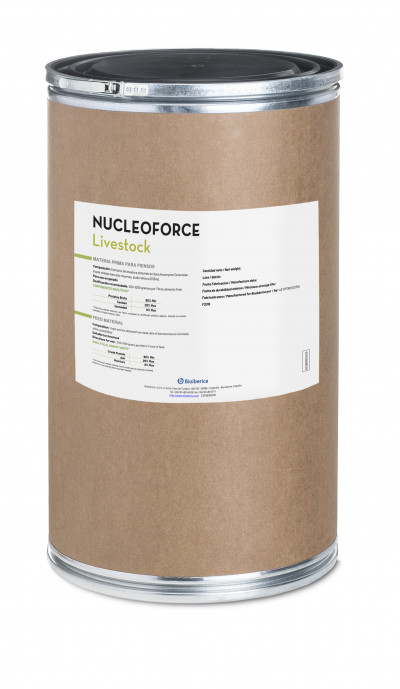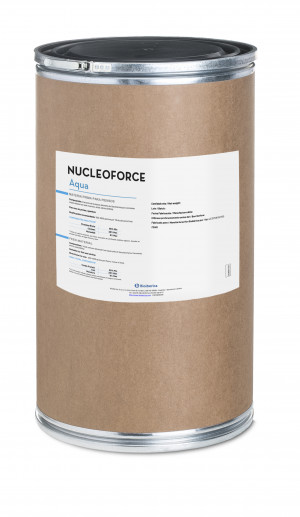
What is it? What is it for?
Nucleoforce Livestock™ is a source of concentrated and balanced free nucleotides and active precursors obtained from yeast.
The unique composition of Nucleoforce Livestock™ has been designed to meet precisely and specifically the needs of monogastric animals (pigs, poultry), helping to optimise the development of the immune and digestive systems.
Nucleotides, as elemental biomolecules of DNA and RNA, are involved in biochemical and cellular processes where there is a high rate of multiplication of genetic material, protein synthesis, cell replication and tissue maturation. This mainly affects animals in young ages and in challenges of the immune system.
At young ages the immune system and the intestinal system are the two tissues with the highest replication rate, and their rapid maturation and development is very important for a good start of the production.
Nucleoforce Livestock™ helps to prevent diarrhea and pathogen outbreaks in young animals during the rapid maturation phase of the immune and intestinal system. Nucleotides represent a component with great potential to reduce the use of antibiotics in animal production, because of their immunomodulatory capacity and their proven effects in reducing diarrhoea and supporting intestinal development in several animal species.
Principal effects
- Modulates the adaptive response of piglets to weaning stress (1).
- It reinforces the intestinal development in young animals (3).
- Proven effect on the incidence of diarrhoea in piglets (2).
- Positive effect on zootechnical parameters in piglets from mothers fed with nucleotide supplements (4).
- Proven effect on live weight, body weight gain, and feed conversion rate in early stage broilers (5).
- Strengthens the immune system of broilers poisoned by mycotoxins (6).
______________
(1) Effects of dietary nucleotide supplementation on growth performance and hormonal and immune responses of piglets. Animal. P. Superchi-, R. Saleri, P. Borghetti, E. De Angelis, L. Ferrari, V. Cavalli, P. Amicucci, M. C. Ossiprandi and A. Sabbioni. (2012).
(2) Dietary nucleotide supplementation reduces occurrence of diarrhoea in early weaned pigs. Livestock Science 108, 1-3, 276-279. Martinez-Puig D., Manzanilla E.G., Morales J., Borda E., Pérez J.F., Piñeiro C., Chetrit C. (2007).
(3) Study report. Rebuilding of intestinal mucosa in weaned pigs fed with the diet supplemented with nucleotides, immunohistochemistry studies. Department of Physiological Sciences, Faculty of Veterinary Medicine, Warsaw Agricultural University .
(4) Dietary nucleotide supplementation in sows during lactation: effects on piglets performance and mortality. S. Segarra, L. Pérez, E. Fabian, E. Borda & A. Palomo. 9th European Symposium of Porcine Health Management.
(5) Efficacy of a nucleotide preparation in broiler chickens. 16th European Symposium on Poultry Nutrition 2007. E. D. Martínez-puig, E. Borda & C. Chetrit.
(6) The role of dietary nucleotides in reduction of DNA damage induced by T-2 toxin and deoxynivalenol in chicken leukocytes. T. Frankic, T. Pajk, V. Rezar, A. Levart, J. Salobir. Food and Chemical Toxicology 44 (2006) 1838–1844.
Product Information
Appearance
Cream-coloured powder product with characteristic flavour and aroma.Cream-coloured powder product with characteristic flavour and aroma.
Dose
In feed mill the recommended dose is 500 - 1000 g/Tn per ton of feed.
Frequently asked questions about Nucleotides
What are nucleotides?
They are semi-essential nutrients, which are characterised as being the structural unit of the cell's nucleic acids. Their molecular composition is made up of a sugar, a nitrogen base and one to three phosphate groups.
Why are they semi-essential nutrients?
Eggs and milk are substances that are naturally rich in nucleotides, providing young animals a source of nucleotides available for tissues with minimal capacity for de novo synthesis.
Main effects that they cause in animals
Nucleotides are particular necessary for the development of tissues with a high rate of cellular reproduction, such as the reproductive, immune, and digestive systems.
They play an important role in situations in which the animals needs are not covered only with de novo or endogenous synthesis.


